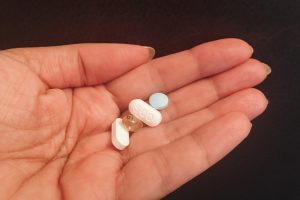What is Abdominal Pain/Bloating?
Abdominal bloating happens when there’s too much gas filling the abdomen. As a result, the air builds up, pushing through the stomach and making it look swollen. This also makes the area more sensitive and more problematic to the touch. Even with slight pressure or sitting down, the abdomen becomes even more distended, causing pain and discomfort. Can a yeast infection cause abdominal pain and bloating?
Can a Yeast Infection Cause Abdominal Pain and Bloating?
Although it sounds unlikely, abdominal discomfort is one of the symptoms of vaginal candidiasis. Candida overgrowth is a vaginal yeast infection that leads to gut symptoms. These include bloating after meals, constipation, and excessive gas. In addition, candida overgrowth can lead to vaginal infection symptoms, cognitive impairment, and constant fatigue if left untreated.
The gut symptoms tend to last for years, with the patient relying heavily on antacids. The antacids can provide temporary relief, fooling patients into thinking it’s a simple case of indigestion and acid reflux. However, because the candida overgrowth remains untreated, the symptoms continue to appear and become more challenging to manage.
Does Yeast Overgrowth Cause Stomach Pain and Bloating?
There are several possible reasons for bloating and stomach pain. While yeast infections are possible, it often takes some time before a guaranteed diagnosis is made. This is because gastroenteritis is more likely to diagnose patients with irritable bowel syndrome when presented with the symptoms. Bacterial vaginosis can also cause abdominal discomfort and bloating to occur.
The chances of having vaginal candidiasis increase depending on several factors. Women on contraceptive pills or long-term antibiotics are more likely to have recurrent yeast infections.
The same is true for people with high-sugar consumption or eating lots of carbohydrates. However, the only sure way to know is through a laboratory test. The test itself is relatively pain-free, with quick results. Once a confirmatory test is made, it’s easier for doctors to suggest a variety of treatments.
How Can a Yeast Infection Cause Abdominal Pain and Bloating?
Pain and bloating can happen with yeast overgrowth. The yeast overwhelms the gut, causing an imbalance between the good and bad bacteria. As a result, the harmful bacteria start to digest the food a person eats and produce a large amount of gas. This gas builds up in the gut, leading to bloating and pain. This is why the symptoms tend to worsen with high-starch food items. Like in bread, the yeast infection causes a “rising” effect in the stomach which causes uncomfortable swelling.
Common Symptoms of Stomach Pain/Bloating
Stomach pain and bloating because of candida yeast can produce other symptoms, including belching, burping, bloating, and stomach pain. Some people report a heavy feeling in their chest area, while others report pain when sitting or lying down. In addition, severe bloating can lead to other problems like constipation, diarrhea, or even blood in the stool.

How Do You Prevent Pain in the Lower Abdomen and Vaginal Discharge?
Good hygiene is the best defense against yeast overgrowth in the vagina. Washing with mild and unscented soaps would be the best way to keep the vagina smelling fresh and clean. Douching and scented vaginal washes can only irritate the vagina and cause an imbalance of good bacteria. Other precautionary treatment options include:
Keep your vagina dry
Keeping the vagina dry and wearing clean underwear daily is one of the ways to prevent a yeast overgrowth infection. Always use a condom during sexual intercourse — even if the patient is on the pill. In addition, doctors recommend wiping from front to back after going to the bathroom. Those suffering from yeast overgrowth should also stop using wet wipes when cleaning their vagina.
Stay away from high-carb foods
Refraining from eating high-carb food items can also minimize bloating and swelling because of candida. Instead, eat only small meals and commit to daily exercises to relieve gas buildup.
Rest properly
Studies show that high-stress levels can also promote fungal growth, so patients need to relax at the end of the day. Losing weight has also been shown to help minimize the chances of yeast overgrowth.
Eat healthily
Food products containing “good bacteria,” like yogurt, can help improve gut balance and make it easier for patients to fight off the infection.
Monitor your medications
Yeast overgrowth can also happen with the use of certain medications. If possible, a change in prescription can help minimize the symptoms.
When to Seek Medical Help
Immediately seek medical help if the pain in the abdomen is too severe for you to function normally. Accompanying symptoms like chest pain, fever, and vomiting should also be causes for concern. If the lower abdominal discomfort lasts more than a day, visit a doctor immediately.
Patients should never ignore symptoms like unexplained weight loss, pain during sex, and bloody vaginal discharge if it has no connection with menstruation. Patients should also consult a doctor if they feel pain or a burning feeling during urination. Even if not listed here, any alarming symptom should also prompt patients to visit their physician.
Frequently Asked Questions
These two conditions together can be because of a woman’s monthly cycle. The bloating and back pain is the body’s response to hormonal changes which can happen before or during menstruation. Even pregnancy can cause these symptoms.
Bloating is best treated with a change in diet. Eating fewer carbohydrates will deprive the bacteria of food that produces gas. Regular exercise also helps the digestive tract so patients can pass the gas and get some relief. Antacid use can promote belching or burping, which dispenses stuck gas.
These two symptoms could result from a bad diet. For example, not eating enough fiber can make it difficult for the stomach to digest food while creating excessive gas. Allergies and food intolerances are also common culprits — mainly if the bloating occurs after eating dairy-based food products.
These two symptoms can indicate a wide range of conditions. For example, cramping with white discharge is a sign of pregnancy. A thick and white discharge with abdominal discomfort is a sign of yeast infection, spastic colon, or sexually transmitted diseases. For some women, the two symptoms indicate their period is coming.
Some medical specialists have observed that the male sperm can cause discomfort in some women’s lower abdomen. This is because sperm can irritate the uterus, causing the uterus to react when there is contact. This contact can trigger uterine contractions leading to cramps or stomach pain.





